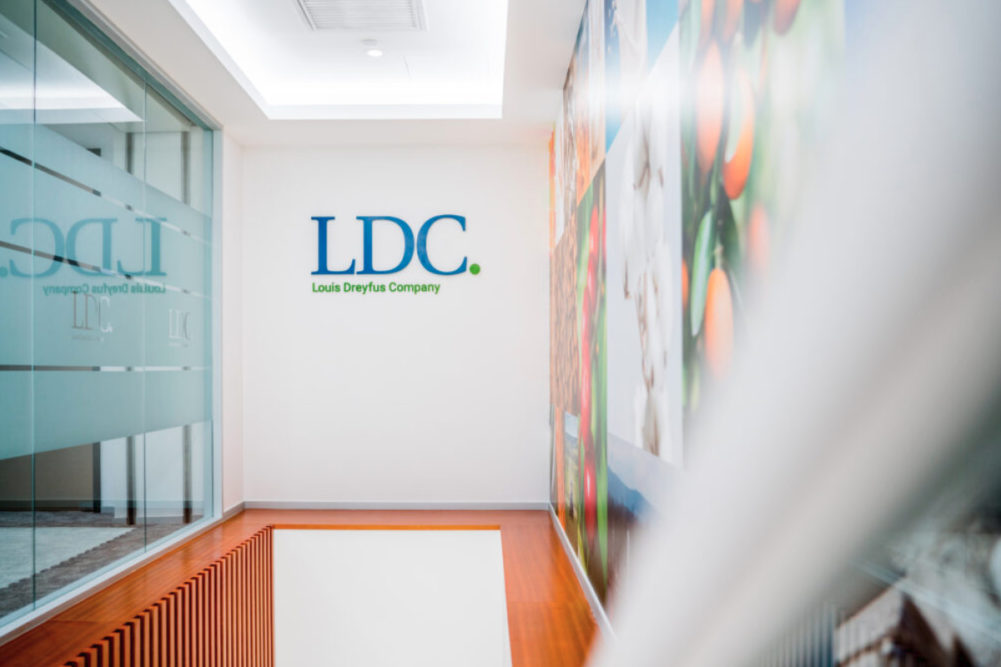ROTTERDAM, THE NETHERLANDS — Even as overall North American results of Louis Dreyfus Co. slipped in 2019 because of a trade conflict between the United States and China, the company’s sugar business performed well.
A review of the North American business was included in the company’s 2019 annual report, published March 23.
Overall LDC net income during the year was $228 million, down 38% from $366 million in 2018. Sales were $33.6 billion, down 6.7%. EBITDA during the year was $836 million, down 21% from $1.1 billion. Net income was boosted by a $218 million gain from the sale of assets.
African swine fever, geopolitical instability and general market oversupply, together with the US-China trade tensions, created a difficult environment for Dreyfus, said Ian McIntosh, chief executive officer.
“While overall results were lower than 2018, LDC put in a solid performance, made the right strategic decisions and took the first steps to adjust its cost base, without losing focus on our transformation plans and future growth trajectory,” he said.
Margarita Louis-Dreyfus, chairperson of the LDC board, said the cost cutting will yield benefits, beginning in 2020. She said the moves are based on “new realities and ensure a solid foundation for growth.” She also cited as important ownership consolidation of the company’s parent Louis Dreyfus Holding BV.
“It secures the flexibility to engage with strategic partners at Group level who could bring further value to the business and make LDC even stronger,” she said. “There is no timeline for such a move, but the confirmation of a strategy envisioned since 2009 now has the potential to become reality.”
In addition to trade tensions, results in North America were hurt by flooding that adversely affected loading efficiency at the company’s Port Allen, La., export elevator.
“In a challenging export environment, we divested our Western Canadian grain elevator network and our wheat export terminal in Portland, Ore., choosing to focus on the value-added steps of our regional Grains & Oilseeds business, while continuing to connect producers with international markets and customers through our remaining facilities,” the company said.
Ethanol margins in North America came under pressure because of trade turmoil and domestic policy.
Still, the company’s Claypool, Ind., plant “delivered strong process margins,” LDC said. Additionally, the passage in the final month of 2019 of a retroactive biodiesel tax credit for 2018-19 boosted results.
Also positive was the company’s Imperial Sugar business, which enjoyed greater profitability because of a better balance between sugar supply and demand.
The company’s Port Wentworth, Ga., plant increased throughput capacity to meet customer demand.
“We increased volumes shipped to destination by 70% year-on-year, and our Imperial Sugar refining business in the US increased sales by 30% compared to 2018,” LDC said.
The Merchandising Segment’s operating income was $387 million in 2019, down 21% from $489 in 2018.
“LDC estimate suggested that the number of pigs raised in China dropped by almost half between 2018 and the end of 2019 due to African swine fever, negatively affecting soybean processing and soy meal sales,” the annual report said.
In addition to the problems at Port Allen, LDC said the delayed plantings in 2019 because of flooding are expected to cut into crop yields, both for 2019 and 2020.
“In addition, US-China trade tensions shifted the balance of exports to China heavily toward Latin America at the expense of the US,” LDC said. “We observed that, having accounted for approximately 50% of grains and oilseeds exports to China for the past five years, Latin America’s export share increased to over 60% in 2019.”
Investments by LDC in 2019 included 330 railcars to facilitate exports from Ukraine, the same number as the company acquired in 2018.
The company also set up a “global digital lab unit” to strengthen the Grain & Oilseeds original model “by further exploring digitally enabled opportunities.”
Other investments by the company were aimed at helping the company progress toward its strategy to “become the value chain,” Mr. McIntosh said. He explained the strategy as intending to integrate more of the agriculture and food chain, “adding more value ourselves on the journey from farm to consumer.”
Steps toward this objective in 2019 included a strategic alliance with Luckin Coffee to distribute juice and produce roasted and ground coffee in China and the launch of several branded cooking oils.
The company also began building a joint venture aquatic feed mill in China and profited from initial public offering investments in a poultry and feed producer in Malaysia and Luckin Coffee in China.
In North America, Dreyfus made food innovation investments, including taking an equity stake in Motif FoodWorks, a Ginkgo Bioworks food ingredients venture.
“The collaboration supports the use of biotechnology to produce innovative affordable and sustainable alternative proteins and other ingredients for plant-based food developers,” LDC said. “This move backed LDC’s strategy to find innovative solutions that respond to changing consumer demand and could help feed a growing global population sustainably.”
In notes, under “Subsequent Events,” Dreyfus said, “As of March 20, 2020, the coronavirus (COVID-19) outbreak had not significantly affected the Group’s operations and performance. At the stage prevailing on the approval date of these 2019 consolidated financial statements of LDC, it is too early to say what impact this outbreak may have on the Group’s future performance.”






